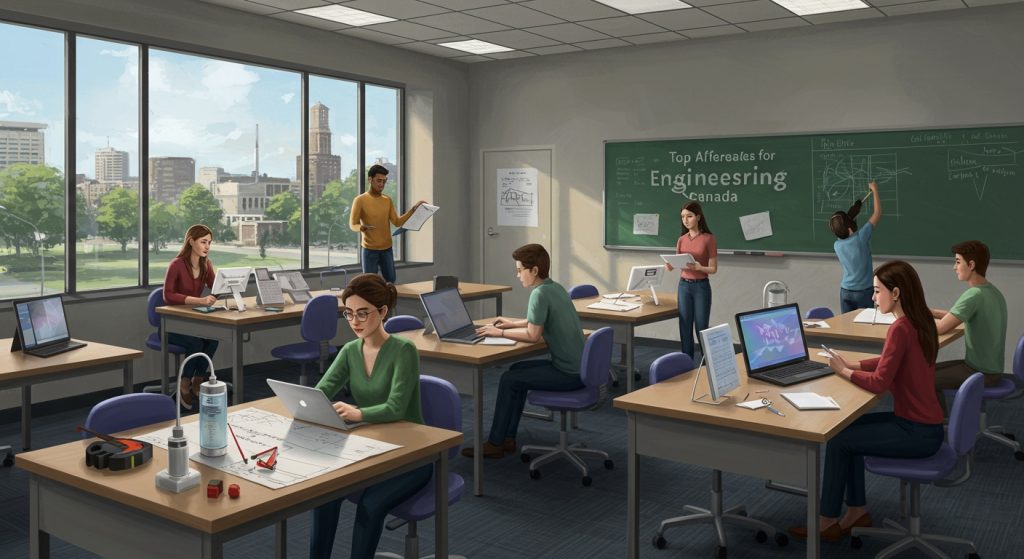Australia’s engineering sector is booming, driven by infrastructure projects and a growing demand for skilled professionals in areas like renewable energy and sustainable development. Selecting the right university is crucial for aspiring engineers. This analysis evaluates Australian universities based on faculty expertise, research output, industry connections. Graduate employability, with a specific focus on emerging fields like biomedical engineering and advanced manufacturing. We’ll examine programs offering hands-on experience, state-of-the-art facilities. Strong ties to leading engineering firms. The ultimate aim is to provide a clear framework for students to make informed decisions about their engineering education and career paths.

Understanding the Australian Engineering Landscape
Australia boasts a robust and internationally respected Engineering sector. Key to this is a strong foundation in education, research. Industry collaboration. Before diving into specific universities, it’s essential to comprehend what makes Australian Engineering programs stand out. Firstly, most Australian Engineering degrees are accredited by Engineers Australia, the professional body for engineers in the country. This accreditation ensures that graduates meet the required standards for professional practice, both nationally and internationally. It also facilitates membership of Engineers Australia, which is often a pre-requisite for Chartered Professional Engineer (CPEng) status. Secondly, Australian universities emphasize practical experience. Many courses include industry placements, internships, or capstone projects where students work on real-world Engineering problems in collaboration with industry partners. This hands-on approach is highly valued by employers. Finally, research is a key driver of innovation in the Australian Engineering sector. Several universities have dedicated research centres and institutes focusing on specific Engineering disciplines, such as renewable energy, sustainable infrastructure. Advanced manufacturing. These institutions attract top researchers and provide students with opportunities to participate in cutting-edge research projects.
Factors to Consider When Choosing an Engineering University
Selecting the right university for an Engineering degree is a significant decision. Here are some key factors to consider: Accreditation: Ensure the program is accredited by Engineers Australia. This is crucial for future career prospects. Specialization: Different universities excel in different Engineering disciplines. Consider your area of interest (e. G. , civil, mechanical, electrical, chemical, software) and research which universities have strong programs in that area. Research Opportunities: If you are interested in research, look for universities with active research centres and opportunities for undergraduate research. Industry Connections: Universities with strong industry connections offer better opportunities for internships, placements. Graduate employment. Location: Consider the location of the university and whether it suits your lifestyle and career aspirations. Some cities have stronger job markets for certain Engineering disciplines. Cost: Tuition fees and living expenses can vary significantly between universities and cities. Consider your budget and explore scholarship opportunities. Entry Requirements: Entry requirements vary depending on the university and program. Check the academic requirements, English language proficiency requirements. Any other specific requirements.
Top Universities for Engineering in Australia: A Detailed Look
While ranking universities is subjective and depends on specific criteria, some consistently rank highly for Engineering in Australia based on factors like research output, graduate employability. Industry reputation. Here’s a detailed look at some of the top contenders: University of Melbourne: Renowned for its broad range of Engineering disciplines and strong research focus. Offers comprehensive programs in civil, mechanical, electrical, chemical. Software Engineering. Strengths: Strong research output, industry collaborations, graduate employability. Specialties: Biomedical Engineering, infrastructure Engineering. Real-world application: Collaborations with major infrastructure projects in Victoria. University of New South Wales (UNSW Sydney): Known for its practical, industry-focused approach to Engineering education. Offers a wide range of Engineering programs and has strong ties to the Sydney business community. Strengths: Industry connections, practical experience, high graduate employment rate. Specialties: Renewable energy Engineering, aerospace Engineering. Real-world application: Active research in solar cell technology and sustainable energy solutions. Australian National University (ANU): A research-intensive university with a strong focus on innovation and interdisciplinary research. Offers programs in Engineering, computing. Environmental science. Strengths: Research intensity, interdisciplinary approach, international collaborations. Specialties: Systems Engineering, photonics. Real-world application: Development of advanced sensing technologies for environmental monitoring. University of Sydney: Offers a wide range of Engineering programs and has a strong reputation for research and teaching. The university emphasizes innovation and entrepreneurship. Strengths: Research reputation, diverse program offerings, entrepreneurial focus. Specialties: Robotics, data science. Real-world application: Research in autonomous systems and artificial intelligence. Monash University: A large, comprehensive university with a strong Engineering faculty. Offers a wide range of programs and has a strong focus on industry engagement and international collaborations. Strengths: Industry engagement, international collaborations, comprehensive program offerings. Specialties: Advanced manufacturing, sustainable Engineering. Real-world application: Development of advanced materials for automotive and aerospace industries. University of Queensland (UQ): Known for its strong research focus and its contributions to sustainable Engineering and biotechnology. UQ offers a wide range of Engineering programs and has strong ties to the mining and resources sector. Strengths: Research contributions, sustainable Engineering focus, industry connections. Specialties: Mining Engineering, chemical Engineering. Real-world application: Development of sustainable mining practices and technologies.
Comparing Key Engineering Disciplines and Universities
The best university for you depends on your chosen Engineering discipline. Here’s a brief comparison:
| Engineering Discipline | Top Universities (Examples) | Key Focus Areas |
|---|---|---|
| Civil Engineering | University of Melbourne, UNSW Sydney, University of Queensland | Infrastructure design, construction. Management; sustainable development. |
| Mechanical Engineering | Monash University, University of Sydney, University of Adelaide | Design and manufacturing of mechanical systems; robotics; automation. |
| Electrical Engineering | UNSW Sydney, University of Melbourne, RMIT University | Power systems; telecommunications; electronics; control systems. |
| Chemical Engineering | University of Queensland, Monash University, University of New South Wales | Process design; chemical reactions; materials science; biotechnology. |
| Software Engineering | UNSW Sydney, University of Melbourne, Australian National University | Software development; computer systems; data science; artificial intelligence. |
| Mining Engineering | University of Queensland, Curtin University, University of New South Wales | Mine planning, design. Operation; mineral processing; environmental management. |
Real-World Applications and Case Studies
To illustrate the impact of Australian Engineering education, let’s consider a few real-world applications and case studies: The Sydney Opera House: A prime example of innovative structural Engineering, showcasing the capabilities of Australian civil engineers. While not a direct product of a single university, its construction involved graduates from various Australian Engineering programs. Renewable Energy Projects: Universities like UNSW Sydney are at the forefront of developing advanced solar cell technologies and sustainable energy solutions. Research from these institutions is directly contributing to the growth of the renewable energy sector in Australia. Mining Automation: Universities like UQ and Curtin are working with mining companies to develop automated mining systems, improving efficiency and safety in the mining industry. This involves expertise in robotics, control systems. Data analytics. Biomedical Engineering Innovations: The University of Melbourne and other institutions are pioneering research in biomedical Engineering, developing new medical devices, prosthetics. Diagnostic tools. This research has the potential to improve the lives of millions of people.
The Role of Technology in Modern Engineering Education
Modern Engineering education is heavily reliant on technology. Students are expected to be proficient in using various software tools for design, simulation. Analysis. Examples include: CAD (Computer-Aided Design) software: Used for creating 2D and 3D models of Engineering designs. Examples include AutoCAD, SolidWorks. CATIA. CAE (Computer-Aided Engineering) software: Used for simulating and analyzing Engineering designs. Examples include ANSYS, Abaqus. COMSOL. Programming languages: Essential for software Engineering and other disciplines. Common languages include Python, Java. C++. Data analysis tools: Used for analyzing large datasets and extracting insights. Examples include MATLAB, R. Python libraries like Pandas and NumPy. Building insights Modeling (BIM): A process involving the generation and management of digital representations of physical and functional characteristics of places. BIM is used in Civil Engineering and Architecture projects. These tools enable students to tackle complex Engineering problems and develop innovative solutions.
The Importance of Accreditation by Engineers Australia
Accreditation by Engineers Australia is crucial for several reasons: Professional Recognition: Accreditation ensures that the Engineering program meets the standards required for professional practice in Australia. Graduate Employability: Employers often prefer graduates from accredited programs, as it demonstrates that they have the necessary skills and knowledge to perform their jobs effectively. Chartered Status: Accreditation is a prerequisite for becoming a Chartered Professional Engineer (CPEng), a highly respected professional designation in Australia. International Recognition: Australian Engineering degrees are often recognized internationally, particularly in countries that are signatories to the Washington Accord, an international agreement for Engineering accreditation. Therefore, when choosing an Engineering university, it is essential to ensure that the program is accredited by Engineers Australia. This will significantly enhance your career prospects and opportunities for professional development.
Preparing for Your Engineering Studies in Australia
Once you have chosen a university and program, there are several things you can do to prepare for your Engineering studies: Strengthen your math and science skills: Engineering relies heavily on mathematics and science. Review your knowledge of calculus, physics. Chemistry. Develop your problem-solving skills: Engineering is all about solving problems. Practice your problem-solving skills by working through examples and exercises. Improve your communication skills: Effective communication is essential for engineers. Practice your writing and presentation skills. Learn basic programming skills: Even if you are not studying software Engineering, basic programming skills can be valuable in many Engineering disciplines. Research the Australian culture: If you are an international student, research the Australian culture and customs to help you adjust to your new environment. By taking these steps, you can ensure that you are well-prepared for your Engineering studies and can make the most of your university experience.
Conclusion
Choosing the right engineering university in Australia is a significant step. Hopefully, this guide has illuminated the path. Remember, factors like research opportunities, industry connections. Program specializations should heavily influence your decision. Don’t just chase rankings; consider your personal learning style and career aspirations. As an expert, I encourage you to delve deeper than university brochures. Connect with current students and alumni to gain firsthand insights. Attend virtual open days and explore research labs online. The future of engineering demands innovative thinkers. Your university choice should foster that potential. Consider focusing on institutions actively involved in renewable energy research or advanced materials – areas poised for explosive growth. Ultimately, the “best” university is the one that best aligns with your individual ambitions and equips you with the skills to thrive in a rapidly evolving landscape. Believe in your capabilities, embrace the challenges ahead. Engineer your own success story.
More Articles
France’s Finest: Advanced Engineering Studies
Affordable Engineering Colleges in India: A Value Proposition
Best Canadian Universities for Biotechnology Research
Premier Computer Science Programs in Singapore
FAQs
Okay, so I’m looking at engineering schools in Australia. Which ones generally top the list?
Right, so consistently, you’ll see the University of Melbourne, the University of New South Wales (UNSW), the University of Sydney. The Australian National University (ANU) mentioned as the frontrunners. They’re strong across most engineering disciplines and have solid reputations globally.
Is UNSW really that good for engineering? I keep hearing about it.
Honestly, yeah, UNSW is a powerhouse, especially for practical, industry-focused engineering. They have fantastic facilities, strong industry connections. A co-op program that gives you real work experience while you study. It’s a big draw for employers.
What if I’m interested in something super specific, like mining or petroleum engineering? Does that change the best choices?
Absolutely. If you’re set on mining or petroleum, then Curtin University and the University of Western Australia (UWA) are definitely worth a look. They’re located in resource-rich Western Australia and have strong ties to the industry. They often outrank others in those niche fields.
How much does reputation actually matter when it comes to getting a job after graduation?
It’s a factor, no doubt. A degree from a well-regarded university can open doors and get your resume noticed. But remember, your grades, skills. Experience (especially internships or co-op placements) are just as, if not more, vital. Don’t rely solely on the university’s name.
Besides the ‘big names’, are there any other universities worth considering for engineering?
For sure! Monash University in Melbourne is excellent. The University of Queensland (UQ) in Brisbane has a great reputation, particularly in civil and chemical engineering. RMIT University in Melbourne is also known for its practical and vocational approach to engineering.
What’s something unexpected I should think about when choosing an engineering uni in Australia?
Consider the location! Think about the city’s cost of living, job opportunities in your field. Even the climate. Living in Sydney or Melbourne is different from Perth or Brisbane. It can impact your overall university experience and future career prospects.
Okay, last one. How do I even start narrowing down my options?
Start by figuring out what kind of engineering you’re most passionate about. Then, research the specific programs at different universities, look at the faculty’s research interests, check out the facilities. See if they offer internships or industry placements. Visit the campuses if you can! Websites like QS Rankings and Times Higher Education can provide a general overview. Dig deeper to find the best fit for you.



